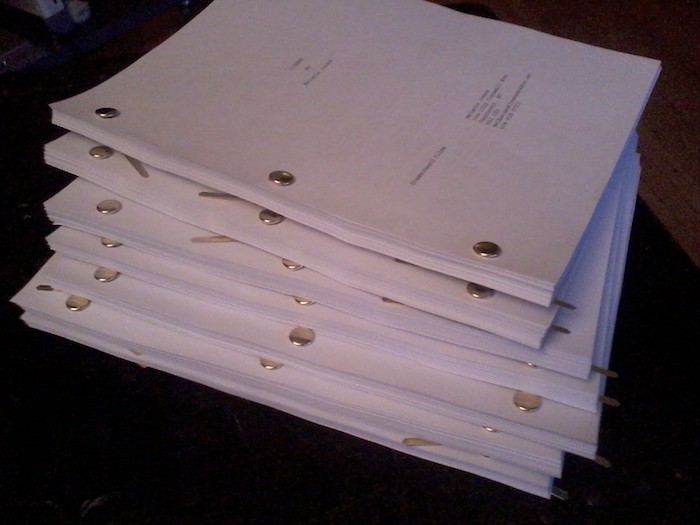
How To Make A Screenwriting Portfolio
Do you know how to make a screenwriting portfolio? The average movie viewer doesn’t know much about cinematography and editing, but the thing about stories is that pretty much everyone can tell when one’s a stinker. No matter how amazing the actors or the costumes are, a lousy script usually means a bad movie.
So, making it as a screenwriter may be a challenging endeavor. Acknowledgment and employment are the first goals to achieve. This requires a solid portfolio of your best writing. The emphasis should be placed on that last part.
What Should Be In Your Portfolio?

- Your portfolio should include a brief personal statement explaining your writing style.
- If you have any screenplays that have been adapted into a film, television program, video game, etc., provide a video clip showcasing your work.
- If you’re presenting work you did with others, such as a paper you co-wrote, be sure to specify your role and provide proper credit where it’s due.
- Don’t include work that you didn’t create.
- Make your website visually appealing. Even though text is all you have to work with, youmay nevertheless create an attractive website. Having the visual style correspond with the tone of your content is worthwhile. For example, you wouldn’t want a site that looks depressing if you write comedies.
Items To Include In A Portfolio For Screenwriters

Highlight success if you have been nominated or long-listed in a competition, but don’t put more than a few pages of a screenplay you’re pitching or plan to submit on your website.
If you want to show that you are serious about writing as a vocation, entering contests is a smart first step.
While the above are some solid suggestions for things to include, keep reading for the steps to get to the point where you have something to include in your portfolio.
Write A Lot

Don’t waste time trying to be perfect from the get-go because no one is. Just write – even if it’s wacky or total garbage.Of course, the more content you have, the more editing you’ll have to do.
If you start out with a dozen mediocre scripts and end up with one great one, you’ve still succeeded.Although everyone’s writing process is unique, honing your craft via regular practice increases the likelihood that you’ll eventually create a script worth developing into a film.
You might participate in National Novel Writing Month, intended to encourage budding authors but may be adapted to suit your requirements if you’re a screenwriter.
The target word count is 50,000. However, screenplays are often evaluated based on page count (generally between 95 and 125 pages). Word counts for screenplays may range anywhere from the low thousands to the high twenties, depending on the amount of dialogue.
If you take this writing prompt seriously, you may produce many scripts! Certainly not for everyone, but it may be an excellent motivator for those who find it challenging to sit down and write daily.
Choose Your Pieces Carefully

If you’re writing a screenplay hoping to get a future job or sell it, what you’re writing is a speculative script.
A screenwriter may have several of them in his or her portfolio, but they may never be produced. You’ll need to come to terms with this fact about your portfolio. Rather than being a catalog from which to make a purchase, it is frequently a reflection of your skills.
If you want to be hired as a writer, one of the best ways to stand out is to submit a well-written sample screenplay. It’s good to have a second pair of eyes review your work for editing reasons to avoid embarrassing typos and language blunders.
Creating a scene from a movie or an episode of a TV show is sometimes more straightforward and practical than writing the whole film or show. By doing so, you may showcase some of your work in your portfolio while putting certain pieces away for future projects.
Pick One Genre for Your Brand

In their script samples, many writers make the rookie error of switching genres too often.
You may be a romantic at heart, but is your portfolio otherwise entirely science fiction? It doesn’t fit and might throw off your image as a whole. Simply said, you want to establish your brand as a screenwriter.
That’s not to say you can’t branch out into other types of writing down the road. Many successful screenwriters establish their dependability in one genre before branching out into another. At the beginning of your career as a screenwriter, writing in one genre is a solid tactic, however.
Get Honest Feedback

In addition to having your portfolio edited, getting some critical input from experts in your field is a good idea. This might help you gauge the general reaction to your content.
Furthermore, this is the perfect moment to fix any issues with your portfolio before sending it out to production firms.
Although it may be challenging to get if you are not enrolled in a film school or comparable program, some insider input might help your showcase stand out from the crowd, which is every other screenwriter in the world.
Be Ready to Re-Write
In our minds, at least, most believe that we are invincible. However, one of the first things you should learn as a writer is that you will need to write, rewrite, and edit several times before you’re satisfied with the final product. Even the best scripts must be refined before they’re ready for production.
Even Hemingway said that “Getting the words right” was the part of the writing process that baffled him the most.
This fact makes it hard to know when to stop revising, primarily when our art relies so much on it. Reports indicate that Hemingway revised the last page of A Farewell to Arms almost thirty-nine times before finally settling on the final version.
If you find yourself frustrated by the scriptwriting process, know that you are not alone and you’ll get there eventually.
Create Some Buzz
So, you’ve put up an impressive portfolio. Packed with unread scripts that would sell like hotcakes if only someone would read them.
Fabulous!
If that’s the case, then why aren’t they reading them?
This is usually because you aren’t marketing yourself well enough. You need to be making noise about your work, whether at industry gatherings where you want to make connections or on social media. A portfolio that doesn’t generate conversation won’t do anything for your career.
Network
This is related to critiquing your own work. However, you should not neglect to discuss another crucial factor: yourself.
The people you know are more important than the skills you have when it comes to finding work. This is true in various fields, but it is particularly prevalent in the film and television production sectors.
Getting out there and connecting with the appropriate individuals, even digitally, might put you on someone’s radar. Which, in turn, might result in fantastic possibilities to write.
You may promote yourself in many ways, not the least of which is by networking. Even if you’re not a corporation, you may still offer a “brand” to the world.
For the most part, this is carried out via social media platforms. The more you participate in appropriate online forums, the more exposure your brand and, by extension, your work will get.
It may be best to sell yourself before your writing to get your point through.
You can join professional groups or connect with other scriptwriters on LinkedIn. Don’t forget to interact with them; post in the group and let others know your thoughts. With the appropriate use of #hashtags, you can even start valuable conversations on Twitter.
Try:
#screenwriting #screenwriter #amwriting #writerwednesday #WriteChat
As intuitive as social networking may appear, it’s not always easy to rapidly get followers. In the beginning, things will move slowly, and the number of people following you will increase similarly. However, if you keep at it, you could be noticed by the “correct” individuals on social media.
Repeat
The true secret to building a solid scriptwriting portfolio is repeatedly doing all of the above. Don’t give up or become disheartened if you have to wait a while before seeing any success as a writer.
Keep doing what you’re doing until someone notices you. You need just to do one notable feat to set yourself on the road to fame and fortune.
Or at least the guarantee of a steady income.
That being said, there it is. Creating a resume for a career in scriptwriting from scratch is simply… hard. Sure. However, if you have ambition, you will see this task as a stepping stone.
Ignore your fears and get to work!
Related: